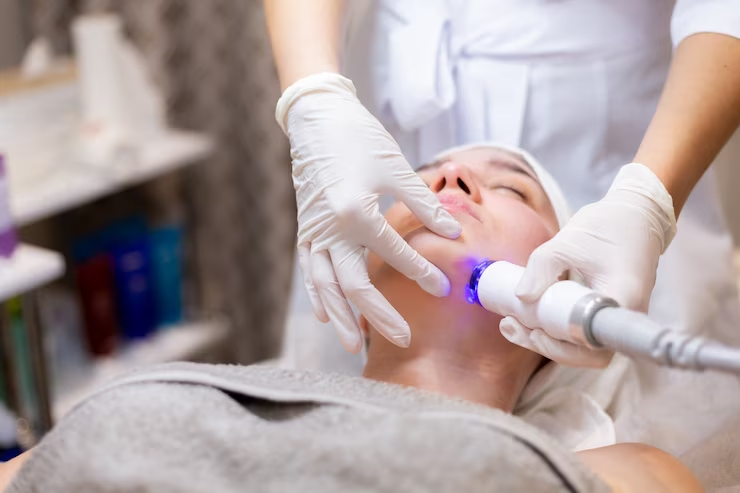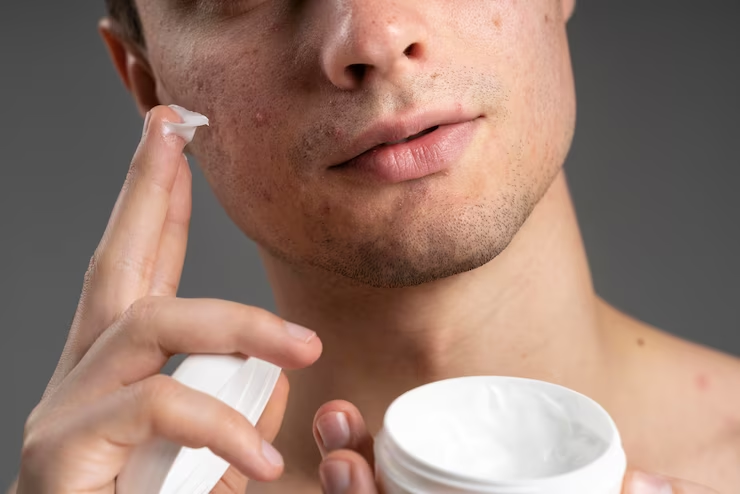
There are many ways to improve the look of your skin, but laser treatment may be the most effective. It's an advanced dermatological treatment that uses light energy to repair damaged tissue and reduce blemishes.
Laser treatment can be used on various skin conditions, including acne scars and tattoos. Still, it's especially effective for treating acne scars because it stimulates new collagen production that fills in depressed areas on the skin.
This article will explore the different types of lasers used for acne scar treatment and how they work. We'll also give some insight into what you can expect from each type of laser treatment to decide which one is right for you.
Types of Acne Scars
Acne scars are a common side effect of acne. The appearance of acne scars varies depending on the type of acne you had and how long you had it for.
Let's talk about the different types of acne scars. __ Ice-pick scars__ are deep, narrow, pitted scars that can occur when a pimple ruptures below the skin's surface, creating a small crater in the skin.

Image source: https://sozoclinic.sg/wp-content/uploads/Ice-Pick-Scar-Treatments-Singapore-1024x612.jpg
Rolling scars
are broad depressions with a sloping edge that occurs when a cyst or nodule breaks open.
Image source: https://post.medicalnewstoday.com/wp-content/uploads/sites/3/2020/11/shutterstock_1193698840_thumb-732x549.jpg
Boxcar scars
are broad depressions with sharply defined edges that occur when acne spreads deeper into the skin and causes inflammation and damage to underlying tissue.
Hypertrophic or keloid scars
– thick lumpy scars that form when damaged tissue heals improperly and creates excess collagen growth in response to injury.
Image Source: https://www.dermatologyadvisor.com/wp-content/uploads/sites/20/2020/08/Hypertrophic_Scar_GettyImages-1142492665-scaled.jpg
__Post-inflammatory hyperpigmentatio__n - also known as "brown spots" that are small, dark spots that appear on the skin after a pimple heals.

Laser Treatments for Acne Scars
Atrophic scars, including boxcars, ice pick, and rolling scars, are all types of scars that occur when the skin heals after a wound. Atrophic, which means "loss of muscle tissue," is a type of scar characterized by a sunken area of skin that has lost some of its fat.
Chemical peels
Chemical peels remove the damaged outer layer of skin and replace it with new, healthy cells. This helps to reduce the appearance of scarring by removing discoloration and smoothing out the skin's surface.
Chemical peels can be done using glycolic or salicylic acid, often combined with other treatments like lasers or cortisone injections to maximize results.
Chemical peels are usually done in several treatments over weeks or months, depending on how severe your scarring is. After each treatment, you'll have some downtime where your skin will be red and sensitive before it eventually heals up again.
Microneedling
Microneedling is a laser treatment that uses tiny needles to puncture the skin, stimulating the body's natural healing and rejuvenation processes. This can help with acne scars by encouraging new collagen production in the skin and stimulating blood flow to promote cell turnover.
Dermabrasion
Dermabrasion is one of the most effective laser treatments for acne scars. It involves removing the top layer of skin, which can help reduce the scar's appearance. Dermabrasion can also treat acne scars, stretch marks, and keloid scars.
Dermabrasion is performed under local anesthesia in an outpatient setting. It can take up to three weeks for your skin to heal after dermabrasion. During this time, you should avoid sun exposure and use sunscreen daily to prevent discoloration or scarring.
Dermal fillers
Dermal fillers are injectable gels that help smooth the skin and give it a youthful appearance. These gels are injected into the skin, where they help to plump up thinning or sunken areas. Dermal fillers are safe, effective, and relatively easy to use. They can treat acne scars on any body part, including the face, hands, and legs.
Dermal fillers can also be used with other treatment options like laser resurfacing or chemical peels to help improve overall skin health and appearance.
Laser therapy
Laser therapy is also a great laser treatment for acne scars. It works by stimulating the healing of the skin, which can help reduce the appearance of scars. The laser is also used to break up skin redness and inflammation and improve the color of scars.
The length of your treatment depends on your specific needs and goals. It is recommended that patients receive between three and five treatments per week for four weeks to achieve optimal results.
Punch excision
Punch excision is a laser treatment for acne scars that involves making an incision in the scar and removing the scar tissue. The wound is then closed with stitches or staples, and aftercare instructions are given to help promote healing. Dermatologists and plastic surgeons often perform this and will likely need local anesthesia before undergoing this procedure.
Punch grafting
Punch grafting is a laser treatment for acne scars that uses a small punch to remove a small piece of skin from an area that's not affected by the scarring and transplant it to the scar. The transplanted skin will help to fill in the acne scar, giving it a more normal appearance.
Subcision
Subcision is a minimally-invasive procedure that involves injecting a saline solution into the scar to break down its connective tissue. This allows the skin to stretch and create new collagen, which helps to soften and smooth the scar.
Preparing for Acne Laser Treatment
Stay away from the sun
If you're getting a laser treatment for acne, make sure you're limiting your sun exposure. While the laser will help clear up your blemishes, it can also make them darker if you don't take care of your skin beforehand. If you want to be as safe as possible, stay out of the sun entirely and wear sunscreen when you do go out in it.
Avoid smoking
Smoking is a bad habit that can harm your skin. It's important to stop smoking before you undergo laser treatment for acne because smoking can increase the risk of your skin discoloration or developing scarring after the procedure.
Avoid using active skincare products
You should stop using benzoyl peroxide and retinol for at least one week before your appointment, as these can increase the risk of scarring. These can dry out your skin and make it more sensitive, making the laser more painful or increasing the likelihood of scarring.
No other prior treatments
It's important that you don't have another skin treatment before or around your acne laser treatment. This is because the laser beam works by heating the sebaceous glands in your skin. If you have other treatments that heat up the skin, it can affect the effectiveness of the acne laser treatment.
Potential Benefits and Risks Of Laser Treatment for Acne Scars
The potential benefits and risks of laser treatment for acne scars depend on the particular laser used and the skill and experience of the person administering it. But overall, the risks associated with this type of procedure are also low—it's just important for patients to follow all instructions their doctors give about proper aftercare.
Lasers can be incredibly effective at reducing or eliminating acne scars, but they can also inappropriately burn the skin of inexperienced practitioners. While ablative laser treatments are often touted to minimize acne scars and stretch marks, they can also cause damage if not used correctly or if proper care isn't taken after treatment.
Frequently Asked Questions (FAQs)
How Much Does Laser Treatment for Acne Scars Cost?
Laser treatments can be expensive, and there is no single answer to the question of how much a laser treatment costs. The price will depend on the laser intensity, your skin type, hair color, and whether or not you have any previous scarring.If you use a more intense laser treatment like Fraxel or Thermage, expect to pay between $1,000 and $3,500 for a single session. If your skin is darker than light brown, you will likely need more than one session to achieve the desired results with these lasers.
If you use a less intense laser such as Clear + Brilliant or CO2 fractional lasers, expect to pay between $300 and $700 per session, depending on how many treatments it takes to eliminate your sun spots or acne scars.
How Long Will It Take to See Results?
The time it takes to see results depends on the type of treatment you are having, how much skin is being treated, and how well your body responds.Depending on your acne's severity, one session may not be enough to clear it up completely. You may need several sessions over time before you see results. You should expect to see results within the first three months of treatment, but you may need to wait for six months or more before seeing the full impact of this treatment.
How Long Will It Take to Recover Acne Laser Treatment?
The recovery time after an acne laser treatment depends on your acne's severity. After your first treatment, you may experience some redness or swelling, but this should fade within a day or two. You may also notice small scabs on your skin, usually falling off within a few days.Conclusion
Acne scars can be a real pain, not only because of the damage they cause to your skin but also because of how they affect your self-esteem. Laser treatment for acne scars is a great option for those who want to restore the smooth, even skin they once had. You can get rid of those pesky scars with the right doctor and laser.
If you are considering laser treatment for acne scars, we encourage you to consult with a dermatologist so that you can learn more about this procedure and ask any questions you may have.









